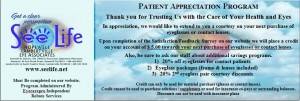Summer Eye Problems
While the hot weather gives us a warm welcome from the chills of winter and the showers of spring, hot weather can also have adverse effects on the eyes. There are many potential threats to your health and your eyes from the hot weather that require a greater necessity for precautions to keep your eyes your body healthy all summer long.
The eyes can be affected by all sorts of weather, and while eye problems can be experienced at any time of year, certain eye issues are more prevalent during the hot weather months of the summer. Summertime exposure to the sun's ultraviolet rays can increase the risk of cataracts and retinal damage. Here are some other common summer eye health problems:
Dry eyes
The risk of dry eyes can increase during the summer due to high temperatures, use of fans and air conditioning. Typical symptoms include redness in the eyes, sore and gritty eyes that are more watery than usual and light sensitivity. This is due to tear film evaporation leading to discomfort and lesser tolerance to contact lens use.
Use eye drops
If you find yourself with dry eyes because of the hot summer weather, lubricating eye drops can help. Artificial Tears - Wetting agents will replicate your natural tears and ensure long-term hydration with fewer applications than most eye drops. Ask our doctors for their recommendations such as Freshkote, Theratears, Systan, Refresh…. available on our webstore: https://seelife.myeyestore.com/
Pterygium/Pinguecula
Not only can the sunshine cause sunburn, but it can also cause a pterygium or a pinguecula if you're not careful to shield your eyes from harmful UVA and UVB rays. Wearing high-quality sunglasses with protection during the summer months is essential if you wish to avoid various problems, including dry eyes, blurry vision, and a gritty feeling.
Increased risk of infection
While eye infections can occur throughout the year, certain summer activities can increase the risk of infection. For example, swimming and camping may expose you to pathogens such as Acanthamoeba, resulting in Acanthamoeba Keratitis.
Summer eye allergies
Eye allergies are often associated with springtime when the pollen count increases. Nevertheless, specific allergens are more common during the summer months, such as molds and seeds. These allergens can increase the symptoms of eye allergies, causing dry and itchy eyes and a burning sensation.
Caring for your eyes during the summer
It is just as important to take care of your eyes during the summer as it is the rest of the year. You should still follow the same eye care rules, such as washing your hands before handling contact lenses and ensuring you are wearing the right eyewear when engaging in certain sports and activities. In addition to this, here are some other things you can do to keep your eye safe and healthy:
Wear sunglasses
Wearing sunglasses with UVA and UVB protection is essential, even when it's cloudy outside. Even if you wear contact lenses with built-in UV protection, it's still important to wear sunglasses as they protect the surrounding eye area and act as a barrier between your eyes and the summer heat to prevent dry eye.
Drink lots of water
The hot weather during the summer months is more likely to cause dehydration, affecting your body's ability to produce tears. This can lead to dry eye, so staying hydrated by drinking lots of water is ever so important. During the summer season, dehydration is more likely, affecting your body’s ability to produce tears and lead to dry eye symptoms and discomfort as well as a lesser tolerance for contacts lenses.
Limit your exposure to allergens
While it's not entirely possible to avoid exposure to all allergens, especially those outside, you can take precautions to limit your exposure and protect your eyes from allergic reactions. Washing your face as soon as you come in from outside and wearing sunglasses can certainly help.
Wear goggles - Contact Lens Use Precautions
No matter where you’re swimming, be it a pool or a lake, wearing swimming goggles will prevent contaminants such as Acanthamoeba from entering your eyes and causing bacterial infections such as Acanthamoeba Keratitis and other eye diseases. This type of infection as well as others can be sight threatening occurrence. Using goggles is essential and avoiding re-usable contact lens use. However, single use lenses can be considered acceptable during water sports as long as they are discarded after the activity.
Heatstroke and Heat Exhaustion
https://www.cedars-sinai.org/blog/heatstroke-and-heat-exhaustion-what-you-need-to-know.html
Symptoms of heatstroke include: · High body temperature, but no sweating · Blurred or double vision · disorientation - Headache · Muscle cramps · Vomiting · Nausea. If you think a person may be experiencing heatstroke, seek immediate medical help. Call 911 or your local emergency services number. Take immediate action to cool the overheated person while waiting for emergency treatment. Get the person into shade or indoors.
In summary, it’s critical to stay hydrated by drinking plenty of water, if outdoors, stay in the shade, limit your time outdoors, limit exercise and outdoor activities to the cooler hours of early morning.




